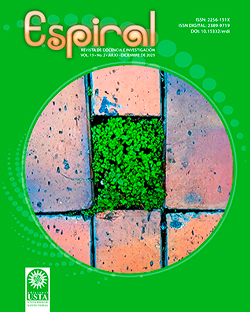Motivation and reading habits: a view from Edwin Locke's theory
DOI:
https://doi.org/10.15332/erdi.v13i2.3138Keywords:
Self-efficacy, Goal setting, Discernment spaces, Reading habit, Intrinsic motivation, PredispositionAbstract
The objective was to analyze the incidence of Locke's theory of motivation in the reading habits of eleventh grade students of the José Rafael Faria Bermúdez Institution of Pamplona, Norte de Santander, Colombia. Locke's theory of motivation was taken as a framework of intelligibility. The methodology was based on the qualitative approach with an Action-Research method. The following instruments were used: initial test, interview, field diary and final test. It was observed that the lack of reading habits was produced by negative experiences in imposed readings and pedagogical methods. Based on this, a pedagogical proposal was implemented, aimed at motivating self-efficacy in reading through the establishment of goals. A significant process was obtained that developed a positive predisposition in the students, created spaces for discernment, strengthened their reading habits and self-confidence through intrinsic motivation.
Downloads
References
Aponte Valverde, M. V. (2008). Métodos, preferencias y hábitos de lectura en estudiantes de pregrado. Revista Teoría y Praxis investigativa, 3(1), 29-36. https://dialnet.unirioja.es/servlet/articulo?codigo=3701053
Cárdenas Izquierdo, N. P. (2020). El fortalecimiento de la lectura a partir de la apropiación, el sentido y la experiencia en el aula [Tesis, Maestría en Educación]. Universidad Pedagógica y Tecnológica de Colombia. http://repositorio.uptc.edu.co/handle/001/3412
Chávez Ordóñez, J. P. (2017). La motivación y la eficacia laboral de los trabajadores del Distrito 15D02 Chaco – Quijos Educación Provincia de Napo [Trabajo de grado, Psicología Industrial]. Universidad Técnica de Ambato. http://rCepositorio.uta.edu.ec/jspui/handle/123456789/25465
Díaz Sanjuán, L. (2011). La observación. Universidad Nacional Autónoma de México. http://www.psicologia.unam.mx/documentos/pdf/publicaciones/La_observacion_Lidia_Diaz_Sanjuan_Texto_Apoyo_Didactico_Metodo_Clinico_3_Sem.pdf
Erazo Pabón, J. A. (2017). La motivación en los procesos de lectura. Revista Huellas, 4(1). https://revistas.udenar.edu.co/index.php/rhuellas/article/view/3411
Galiana, Y. (2021). Lecturas obligatorias en el colegio: ¿fomentan el amor por los libros?. Lecturalia. https://www.lecturalia.com/blog/2021/10/06/lecturas-obligatorias-en-el-colegio-fomentan-el-amor-por-los-libros/
Pradas Gallardo, C. (2018). Teoría del establecimiento de metas u objetivos de Locke. Psicología-Online. https://www.psicologia-online.com/teoria-del-establecimiento-de-metas-u-objetivos-de-locke-2156.html
Galván-Cardoso, A. P. y Siado-Ramos, E. (2021). Educación Tradicional: Un modelo de enseñanza centrado en el estudiante. CIENCIAMATRIA, 7(12), 962-975. https://doi.org/10.35381/cm.v7i12.457
Gomes, R. (2003). Capítulo IV: El análisis de datos en la investigación cualitativa. En M. C. de Souza Minayo, (org.), Investigación social: teoría, método y creatividad (pp. 53-64). https://abcproyecto.files.wordpress.com/2013/06/de-souza-minayo-2007-investigacic3b3n-social.pdf
Miles, M. B. y Huberman, A. M. (1994). Qualitative data analysis: an expanded sourcebook. Sage.
Hernández Sampieri, R., Fernández Collado, C. y Baptista Lucio, P. (2014). Metodología de la investigación (6a ed.). McGraw-Hill.
Latorre, A. (2005). La investigación-acción: conocer y cambiar la practica educativa (3ª ed.). Editorial Graó. https://www.uv.mx/rmipe/files/2019/07/La-investigacion-accion-conocer-y-cambiar-la-practica-educativa.pdf
Locke, E. (1968). Toward a theory of task motivation and incentives. Organizational Behavior and Human Performance, 3(2), 157-189. https://doi.org/10.1016/0030-5073(68)90004-4
Locke, E. A. y Latham, G. P. (2002). Building a practically useful theory of goal setting and task motivation: A 35-year odyssey. American Psychologist, 57(9), 705–717. https://psycnet.apa.org/doi/10.1037/0003-066X.57.9.705
Locke, E. A. y Latham, G. P. (1990). A theory of goal setting & task performance. Prentice Hall. https://web.mit.edu/curhan/www/docs/Articles/15341_Readings/Motivation/Locke%20Theory%20of%20Goal%20Setting%20Ch%201-2.pdf
Torres Arias, R. (2013). Evaluación diagnóstica. Ministerio de Educación Pública. https://recursos.mep.go.cr/evaluacion_aprendizajes/data/evaluacion_diagnostica_2013.pdf
Alejo, M. y Osorio, B. (2016). El informante como persona clave en la investigación cualitativa. Gaceta de Pedagogía, (35), 74-85. https://www.researchgate.net/publication/337428362
Sandoval Velasco, A. M., Gutiérrez Díaz, C. C. y Noguera Melo, J. P. (2019). Factores de motivación y desmotivación en la creación de hábitos lectores en el Colegio Orlando Higuita Rojas [Trabajo de grado, Licenciatura en Español y Lenguas Extranjeras]. Universidad de La Salle. https://ciencia.lasalle.edu.co/lic_lenguas/840/
Trindade, V. A. (2016). Capítulo 2: Entrevistando en investigación cualitativa y los imprevistos en el trabajo de campo: de la entrevista semiestructurada a la entrevista no estructurada. En P. Schettini e I. Cortazzo (coord.), Técnicas y estrategias en la investigación cualitativa (pp. 18-34). Editorial de la Universidad Nacional de La Plata (EDULP). https://doi.org/10.35537/10915/53686
Downloads
Published
Versions
- 2025-01-27 (2)
- 2023-12-01 (1)
How to Cite
Issue
Section
License
Copyright (c) 2023 Espiral, Revista de Docencia e Investigación

This work is licensed under a Creative Commons Attribution-NonCommercial-NoDerivatives 4.0 International License.
Publishing and copyright
The authors of the articles accepted to be published, transfer proprietary rights to Espiral, Journal of Teaching and Research for the partial reproduction of the published work in electronic media (websites, indexes, directories), as long as their purposes are academic but not commercial.








